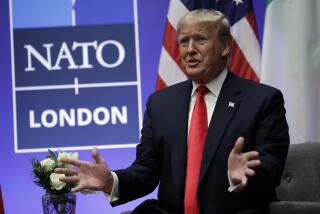U.S. Rejects Soviet Bid to Drop Alliances : Defense: Washington makes it clear that it does not plan to match Shevardnadze’s conciliatory tone with concessions of its own.
- Share via
WASHINGTON — The Bush Administration on Tuesday rejected a Soviet proposal to dismantle both the North Atlantic Treaty Organization and the Moscow-led Warsaw Pact, declaring that NATO remains vital to the security of the West despite Soviet President Mikhail S. Gorbachev’s peace offensive.
Soviet Foreign Minister Eduard A. Shevardnadze called for an end to the rival alliances Monday in a generally overlooked section of his extraordinary speech to Soviet lawmakers--a statement that at times resembled a confession as he admitted Moscow’s blunders, such as the invasion of Afghanistan and construction of an illegal radar installation at Krasnoyarsk in Siberia.
“NATO has played an indispensable role for 40 years in assuring the security and independence of the West,” State Department spokeswoman Margaret Tutwiler said in response to Shevardnadze’s suggestion. “NATO will continue to play that role.”
She added that, although there have been “important changes in the Soviet Union that include reductions in the Soviet military,” Moscow retains a powerful armed force.
Tutwiler made it clear that the United States does not plan to match Shevardnadze’s conciliatory tone with concessions of its own.
She rejected the Soviet foreign minister’s call for the United States to dismantle two U.S. radar installations that Moscow often has attempted to equate with the Krasnoyarsk facility.
She said that the U.S. radars “existed prior to the completion of the ABM treaty in 1972, and their modernization is legal under the treaty.”
In its first detailed reaction to the speech, the Administration said that Shevardnadze’s approach could push the superpower relationship toward a new era of detente. But U.S. officials said that it is far too early to think about disbanding the 16-nation Atlantic Alliance, formed in the Cold War at a time of East-West hostility.
U.S. officials have been concerned for several years that Gorbachev’s reformist policies may erode support for NATO in the United States and Western Europe.
In that respect, Shevardnadze’s speech--which admitted for the first time that the huge radar facility at Krasnoyarsk was a violation of the 1972 ABM treaty and that the 1979 invasion of Afghanistan was both foolish and immoral--was met with mixed emotions in Washington.
In effect, Shevardnadze conceded the truth of more than a decade of American Cold War charges. But, at the same time, the speech increases the difficulty faced by U.S. policy-makers in persuading Western public opinion to continue expensive and often unpopular military programs.
The Administration’s public reaction to the Shevardnadze speech was a combination of astonishment and celebration.
“It certainly seems like a step in the right direction,” White House Press Secretary Marlin Fitzwater said. “The candor and the straightforward nature of the public comments, I think, were a surprise.”
Tutwiler said that Shevardnadze’s “positive assessment of the present state of U.S.-Soviet relations and the potential for further improvement parallels what Secretary (of State James A.) Baker has been saying.”
“We see the opportunity to move to a relationship characterized increasingly by stability, cooperation and the search for mutual advantage,” she added.
“The speech contains some strikingly forthright admissions of past Soviet policy mistakes,” she said. “We welcome such assessments. They reflect new thinking, and they demonstrate the Soviet acknowledgement of the importance of being honest about past policy.”
More to Read
Sign up for Essential California
The most important California stories and recommendations in your inbox every morning.
You may occasionally receive promotional content from the Los Angeles Times.












